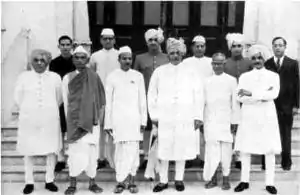U. N. Dhebar
Uchharangrai Navalshankar Dhebar (21 September 1905 – 11 March 1977) was an Indian Independence activist who later served as the Chief Minister of Saurashtra State from 1948 to 1954 and the President of the Indian National Congress from 1955 to 1959.[1] In 1962, he was elected to the third Lok Sabha from Rajkot.[2] In 1973, he was awarded the Padma Vibhushan award.[3]

Life
U.N. Dhebar was born on 21 September 1905 in the hamlet of Gangajala, eleven miles from Jamnagar. After his university education, he started a legal practice as a lawyer. Under the influence of Mahatma Gandhi, he left his legal career in 1936 and joined Indian independence movement.[2]
He served as the President of the Rajkot Mill Kamdar Mandal in 1936, the Secretary of Kathiawar Political Conference in 1937–38, and as the President of Rajkot Praja Mandal in 1938–39.[2]
In 1941, Dhebar was selected by Gandhi to offer Satyagraha at Viramgam. He was arrested and sentenced to six months imprisonment. In 1942, he was again arrested during the Quit India Movement. On the attainment of independence, Dhebar played a prominent role in the integration of the princely states of Kathiawad in the Indian Union and the formation of United State of Kathiawar, later renamed to Saurashtra State.[2] Dhebar was appointed as Chief Minister of Saurashtra State in 1948 and served until 1954. He was responsible for introducing progressive land reforms in Saurashtra.[4]
Dhebar was brought onto the national scene by Jawaharlal Nehru.[4] Dhebar was elected to the Indian National Congress as the president and held a four-year term from 1955 to 1959.[1] His first act as the president was to assemble the top leaders of the Congress to decide how they could best serve the nation.[5] He also created an unemployment dole which was equivalent to the amount of money spent on prisoners.[6] As president of the INC, Dhebar was an avid supporter of the fight against apartheid in South Africa. Dhebar encouraged the South African Indian Congress to follow the steps of Mahatma Gandhi and India’s fight to independence. He repeatedly encouraged the means of non-violence and unity, not only within themselves but also within “your African brethren and all others”.[7] He also predicted that their work would “bring your peaceful struggle for elementary human rights to a successful end very soon.”[8]
Dhebar served as the Chairman of Scheduled Areas and Scheduled Tribes Commission in 1960–61. In 1962, he was elected to the third Lok Sabha from Rajkot. Dhebar was connected with several institutions rendering social and educational services. He was awarded the Padma Vibhushan in 1973.[3]
Dhebar died on 11 March 1977 at the age of 72.[4]
References
- "Second Term For Mr. Dhebar: Congress Presidentship". The Times of India. 18 December 1957.
- "Indian National Congress". Indian National Congress. Retrieved 29 November 2020.
- "Padma Awards | Interactive Dashboard". www.dashboard-padmaawards.gov.in. Retrieved 29 November 2020.
- "U.N. Dhebar Dead". The Times of India. 12 March 1977.
- "Mr. U.N. Dhebar Is Elected: No Other Nominee In The Field". The Times of India. 11 December 1954.
- "Dhebar Suggests Dole: Helping the Jobless". The Times of India. 7 October 1963.
- "Fight Against Apartheid: Be Non-Violent Mr. Dhebar Says". The Times of India. 7 October 1956.
- Quoted in “The Freedom Charter and the United Nations,” http://www.anc.org.za/un/reddy/fcun.html
| Wikimedia Commons has media related to U. N. Dhebar. |